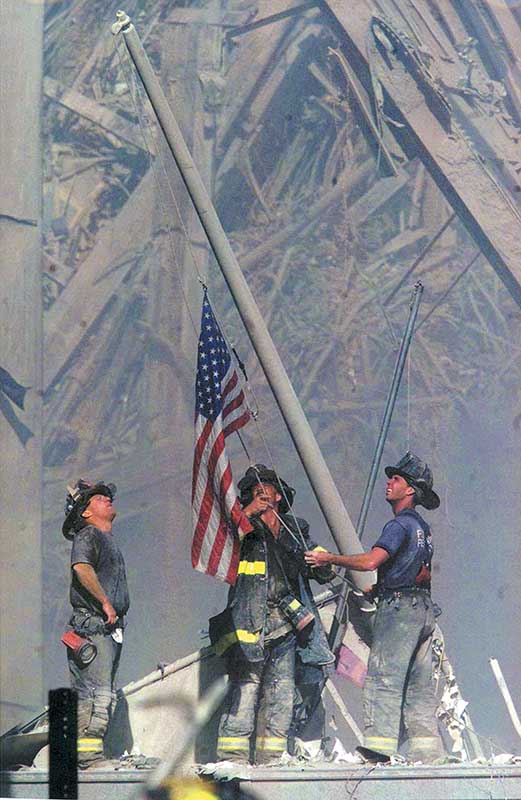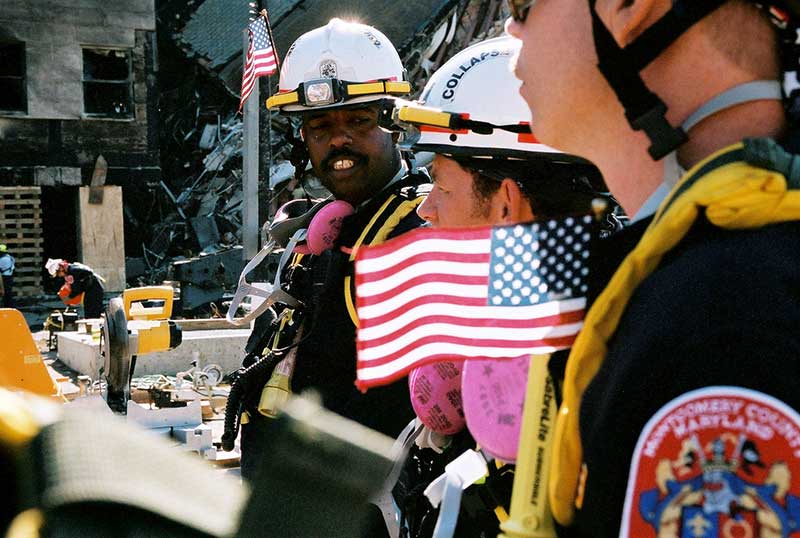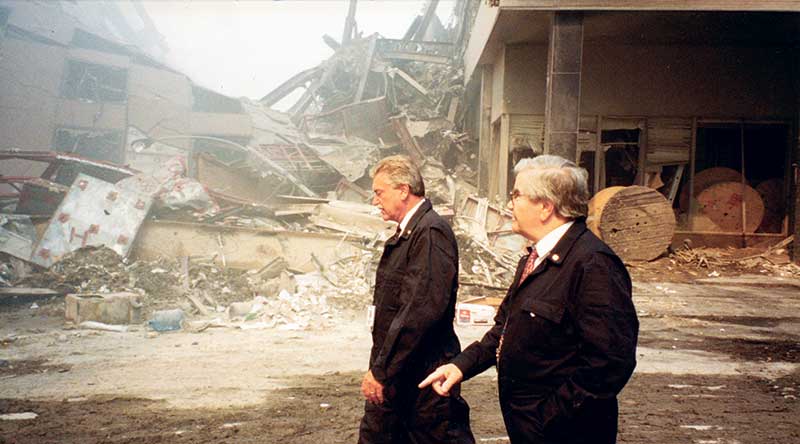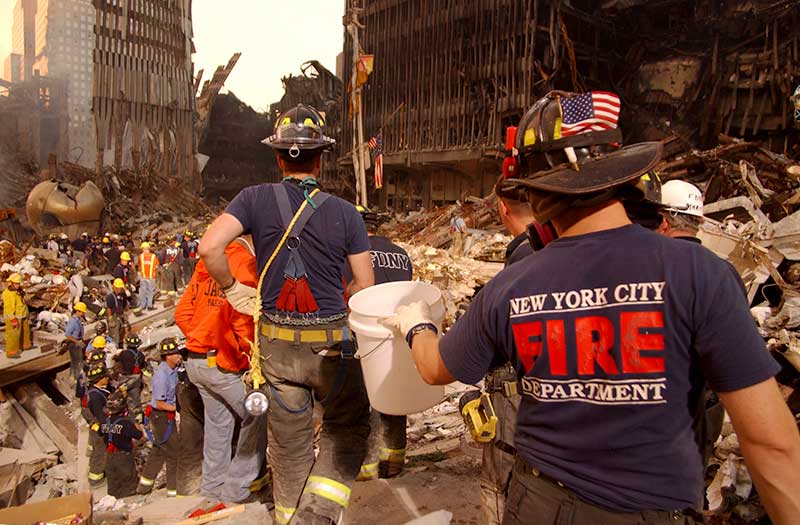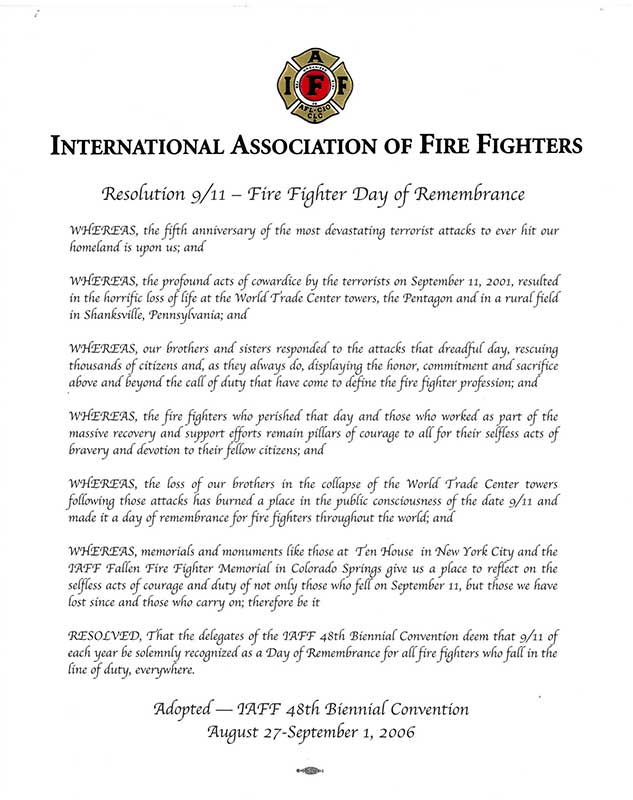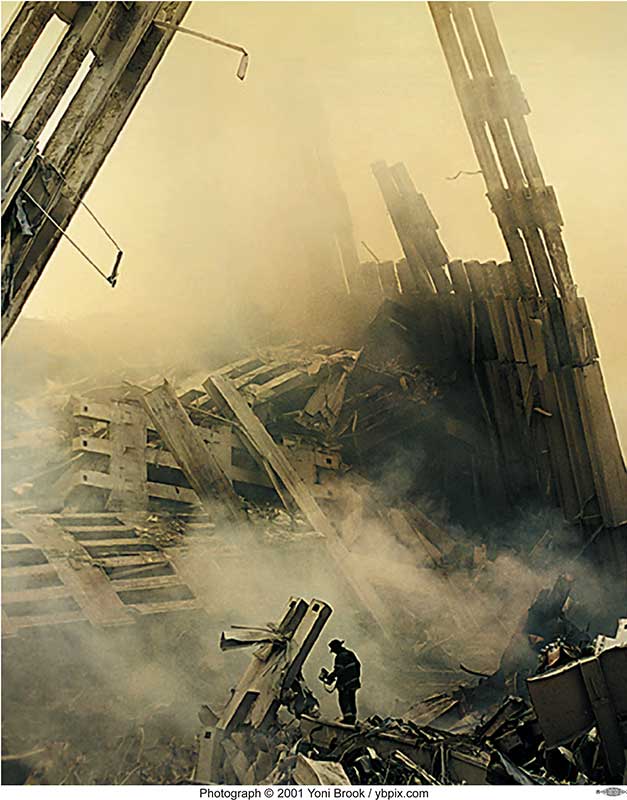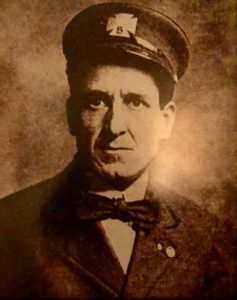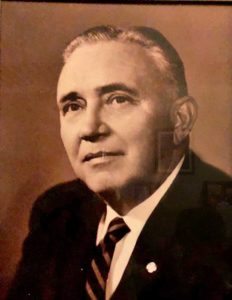Always Remember, Never Forget
The terrorist attacks on the United States on September 11, 2001, will forever be the darkest day in IAFF history. The loss of life and level of destruction was on a scale no one had ever seen in the United States.
Within seconds, thousands of IAFF members responded to the attacks in New York. Members of the Uniformed Firefighters Association (UFA) Local 94 and Uniformed Fire Officers Association (UFOA) Local 854 responded with incredible courage, losing 343 of their own in the rescue efforts. At the Pentagon, hundreds more IAFF members from locals across the Washington, DC, metro area battled flames and risked their lives to pull people from the rubble.
Still more IAFF members assisted in the aftermath of the downed United Airlines Flight 93 in Pennsylvania.
The IAFF response began just seconds after the first plane hit the World Trade Center. Many headquarters staff were already at the office two blocks from the White House, and several were in a meeting with General President Harold Schaitberger, who had been in his position for just one year.
In the days and weeks after the attacks, the International faced the greatest challenge in its history, but rose to that challenge at every level – providing financial and other assistance to survivors, counseling support to members and their families, and staff support to Local 94 and Local 854.
This enormous tragedy changed the nation and the firefighting profession forever. No longer would fire fighters be known just for fighting fires. The tragedy put a spotlight on the profession, and suddenly fire fighters gained more recognition from the public and political leaders for the work they do.
In the aftermath of September 11, the International became the strongest voice for the firefighting profession, advocating for improved safety, equipment and training – propelling fire fighters and fire service issues to the forefront of the national agenda.
IAFF members continue to risk their lives in a profession that should never be taken for granted, but in the years since September 11 are nevertheless targets of political attacks on public employees. It is critically important to remind the public what fire fighters do – not just when terror strikes, but every day and night.
The IAFF’s top priority remains to ensure healthier working conditions and to advocate through the political process for benefits and protections for members and their families.
“No matter how many years pass, we will remember our fallen who made the ultimate sacrifice on September 11 and honor their service with an unbending commitment to ensure the safety and security of all our brothers and sisters.”IAFF General President Harold Schaitberger (2000-present)
September 11, 2001
8:45 a.m. – The hijacked American Airlines Flight 11 flies into the North Tower of the World Trade Center.
9:06 a.m. – The hijacked United Airlines Flight 175 flies into the South Tower of the World Trade Center.
Thousands of FDNY members respond on the morning of September 11. Some 10,000 respond within the first 36 hours of the attack.
9:37 a.m. – American Airlines Flight 77 crashes into the west side of the Pentagon.
9:59 a.m. – The South Tower of the World Trade Center collapses.
10:28 a.m. – The North Tower of the World Trade Center collapses.
IAFF General President Harold Schaitberger is on the ground at the Pentagon just hours after the attack.
8:30 p.m. – President George Bush addresses the nation, calling the attacks “evil, despicable acts of terror” and said America and its allies would “stand together to win the war against terror.”
343 FDNY fire fighters pay the ultimate sacrifice. See tribute to the fallen (PDF).
“When the towers fell, we expected we had lost many hundreds of members and many thousands of civilians in New York, and had little idea of the losses at the Pentagon. We stopped watching the television coverage and discussed our initial plan of action. The General President and I went to the Pentagon and remained there with our members through the night. Early the next morning, we were credentialed by FEMA to go to New York City and Ground Zero.” Rich Duffy, Assistant to the General President for Occupational Health, Safety and Medicine (1978-2013)
IAFF General President Harold Schaitberger and then-General Secretary-Treasurer Vincent Bollon and IAFF headquarters staff establish an IAFF Command Center to assist New York members, reserving an entire floor of rooms indefinitely at the Sheraton New York Hotel and Towers in Midtown. Staff members stay for two months.
“Our fallen brothers and all New York’s fire fighters did what they had to do on that fateful day because they answered the higher calling that is the hallmark of our profession. They placed themselves at risk to save tens of thousands of lives that would have otherwise been lost. They did their job and they did it well.”IAFF General President Harold Schaitberger (2000-present)
“After a certain point in a long career as a fire fighter, you start to think you’ve seen everything. Then something like this happens and you realize there’s always something worse. It is hard to find anything positive, but what I do know is that as many as 20,000 people were in those buildings when the planes hit. Now, 6,000 people are missing. That tells me one thing: our brothers saved a hell of a lot of people.” IAFF General Secretary Treasurer Vincent Bollon (1998-2009)
“Almost all of you pitched in one way or the other to raise money or other resources for our devastated families. Thousands of you volunteered to help us in our search and recovery operations. Hundreds of you traveled at your own expense to make sure that fire fighters were in uniform at each and every funeral and memorial service we have held. Thank you.” IAFF 1st District Vice President Kevin Gallagher (2000-2014) in gratitude for the assistance of all IAFF members and headquarters staff
The International establishes a charity fund to handle the unprecedented outpouring of support from the public, raising more than $167 million for the 9-11 Disaster Relief Fund.
IAFF members work on the pile at Ground Zero until May 2002 recovering the fallen.
In September 2002, the names of all the fallen are etched onto the granite walls of the IAFF Fallen Fire Fighter Memorial in Colorado Springs, Colorado.
Because the terrorist attacks put a great emphasis on fire and emergency response, the IAFF asks Congress to cut the federal bureaucratic tape to better assist grieving families, and is successful at pushing for the increase in benefits provided through the Public Safety Officers Benefit (PSOB) program and expediting the claim process.
The IAFF secures an additional $200 million in funding for the Assistance to Firefighters (FIRE Act) grant program to help fire departments and law enforcement agencies devise emergency response plans at the state and local level.
The IAFF is successful in developing a new grant program – the Staffing for Adequate Fire and Emergency Response (SAFER) Act – to create an additional 75,000 fire fighter jobs nationwide. Congress authorizes $8 billion over seven years for the program.
In 2006, IAFF delegates at the 48th IAFF Convention in Toronto, Ontario, pass a resolution making September 11 a Day of Remembrance for “all fire fighters who fall in the line of duty, everywhere.”
The James Zadroga 9/11 Health and Compensation Act is passed in 2010 by Congress to provide funding for medical monitoring and treatment for World Trade Center responders and others who became ill because of exposure to toxins at Ground Zero.
The James Zadroga Act in 2010. This 9/11 Health and Compensation Act provides funding for medical monitoring and treatment to World Trade Center responders and others who become ill because of exposure to toxins at Ground Zero.
To commemorate the 10th anniversary of the attacks, the IAFF issues a special challenge coin.
